 Known as one of Russia’s most intellectual and spiritual filmmaikers, Alexander Nikolayevich Sokurov was born in 1951 in the Siberian village of Podorvikha. He graduated from the History Department of Gorky University in 1974 and, in the same year, entered the Russian State Institute of Cinematography. There he befriended Andrei Tarkovsky, whose feature film Mirror deeply influenced him. While at the Moscow Film School Sokurov made his first full length feature, The Lonely Voice of Men, in 1978.
Known as one of Russia’s most intellectual and spiritual filmmaikers, Alexander Nikolayevich Sokurov was born in 1951 in the Siberian village of Podorvikha. He graduated from the History Department of Gorky University in 1974 and, in the same year, entered the Russian State Institute of Cinematography. There he befriended Andrei Tarkovsky, whose feature film Mirror deeply influenced him. While at the Moscow Film School Sokurov made his first full length feature, The Lonely Voice of Men, in 1978.
While the Soviet regime banned most of Sokurov’s early works, he produced many documentaries during his early years, including an interview with the dissident Alexander Solzhenitsyn. It was the feature Mother and Son in 1996 that first brought him international acclaim, a success followed by Father. Before his most recent film Alexandra, he completed the first three features of a planned tetraology on leading rulers of the 20th century, including Moloch (1999) about Hitler, Taurus (2000) about Lenin and The Sun (2004), about Emperor Hirohito.
A poet and metaphysician as well as a filmmaker, Sokurov is frequently compared to Tarkovsky, a comparison he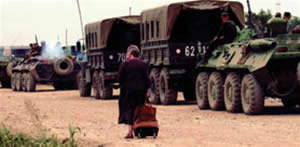 has shunned in the past. Although both director’s films have intensely spiritual elements, Tarkovsky’s are known for their spiritually optimistic tenor while Sokurov’s resonate with a more spiritually oppressive and somber outlook. He is the author of more than 40 features and documentary films and has won numerous prizes at festivals in Cannes (where four of his features have debuted), Venice, Berlin, Locarno, Rotterdam, Montreal and Moscow. His most commercial and critically successful effort to date has been Russian Ark (2002), a full-length, semi-documentary feature praised for its hypnotic images and shot in Hermitage Museum in a single, unedited take.
has shunned in the past. Although both director’s films have intensely spiritual elements, Tarkovsky’s are known for their spiritually optimistic tenor while Sokurov’s resonate with a more spiritually oppressive and somber outlook. He is the author of more than 40 features and documentary films and has won numerous prizes at festivals in Cannes (where four of his features have debuted), Venice, Berlin, Locarno, Rotterdam, Montreal and Moscow. His most commercial and critically successful effort to date has been Russian Ark (2002), a full-length, semi-documentary feature praised for its hypnotic images and shot in Hermitage Museum in a single, unedited take.
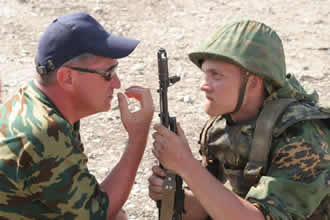 For Alexandra, Sokurov tells the story of an ailing grandmother who struggles to visit her grandson, an officer in the Russian army, in a camp in Chechnya during that region’s current civil war. The director manages to avoid shots of battle and death and instead concentrates intensely on the landscape of the camp and town and, tellingly, of his leading actress’ face, the great Russian opera soprano Galina Vishnevskaya.
For Alexandra, Sokurov tells the story of an ailing grandmother who struggles to visit her grandson, an officer in the Russian army, in a camp in Chechnya during that region’s current civil war. The director manages to avoid shots of battle and death and instead concentrates intensely on the landscape of the camp and town and, tellingly, of his leading actress’ face, the great Russian opera soprano Galina Vishnevskaya.
James Ulmer: I have always known you as a very spiritually involved filmmaker in all your films. Can you tell us a little bit about your spiritual feelings in this particular film, and the spiritual journey you are seeking to show?
Alexander Sokurov: All stories that you want to tell will eventually be about the soul of the person. If there is not an aggression inside of the story, people are not aggressive. If they come together and they love each other, then that to me is a spiritual story. This spirituality feeling is what god has given to us to make life more spiritual.
James: How did you come upon the story of a grandmother who goes to visit her son in Chechnya?
Alexander: Because this is happening all around us. There are many American mothers, daughters, grandmothers who would like to go visit their sons, fathers, and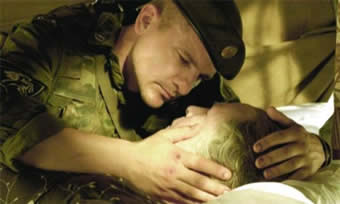 husbands in Iraq. It is a very simple story that is universal.
husbands in Iraq. It is a very simple story that is universal.
James: Have you had a chance to see any American reactions to this film because of their feeling towards Iraq? I wanted your comments on that.
Alexander: I don’t know what the reactions were of the American people. I hope they we will have a reaction of understanding. I believe in the people who live in America, and that we are not very different.
James: You had done a documentary with (the singer) Galinia Vishnevskaya, who stars in Alexandra, and her husband, the late cellist Rostropovic, which I haven’t had a chance to see. Tell me something about your relationship with her. You had known her for many years, and she’s something of a legend in Russia. 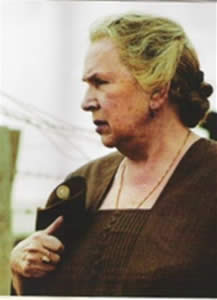 Alexander: She is a legend in Russia and around the world. It is a very unique family with famous musicians and artists. They were fighting communism, and they won. And that is very unique. She is a great citizen. I was going to do a show at La Scala and we were going to do the opera with a composer. We worked with him but he died, unfortunately, so we didn’t finish the story. This was long ago. I really like her; the first time I saw her work I understood that she was an amazing actress. I told myself long ago that if one day I became a filmmaker that I would absolutely love to work with her. I guess there is a god that heard my prayers, because everything worked out.
Alexander: She is a legend in Russia and around the world. It is a very unique family with famous musicians and artists. They were fighting communism, and they won. And that is very unique. She is a great citizen. I was going to do a show at La Scala and we were going to do the opera with a composer. We worked with him but he died, unfortunately, so we didn’t finish the story. This was long ago. I really like her; the first time I saw her work I understood that she was an amazing actress. I told myself long ago that if one day I became a filmmaker that I would absolutely love to work with her. I guess there is a god that heard my prayers, because everything worked out.
James: There may be another prayer that may be answered. Would you be interested in directing an opera for Placebo Domingo in Los Angeles?
Alexander: I would be very interested in it. In Moscow I did an opera so it would be very interesting for me to do this.
James: Has Mr. Domingo approached you with any talk about this while you have been in Los Angeles? 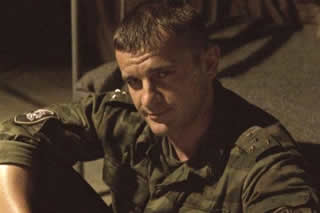
Alexander: No. I don’t know anything about it yet.
James: Will you be coming to the Oscars if you are nominated? I have heard that you don’t travel much. This is your first trip to America, I believe.
Alexander: We’ll see…first I have to get a nomination! (laughter). I really don’t believe it (will happen), to be honest with you.
Born in 1964 in Gorky, Russia, Andrei Sigle began studying music at the age of 5. After a classical music education at a Russian conservatory, he went on to record albums for such popular Russian music groups as “Kino,” “Alisa” and “Nautilus Pompilius.” A turning point in his career came in 1990 when he saw the film Klesh (The Tick, 1990), after which he devoted himself to film composing.
Sigle has composed the music for four Sokurov features, including including Taurus, Father and Son, The Sun and the current Alexandra, for which he also served as a producer.
* * *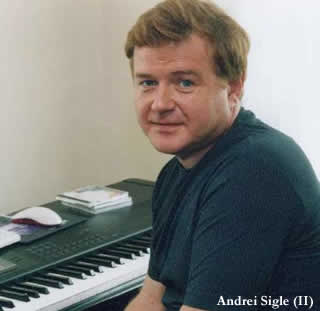 Born in 1964 in Gorky, Russia, Andrei Sigle began studying music at the age of 5. After a classical music education at a Russian conservatory, he went on to record albums for such popular Russian music groups as “Kino,” “Alisa” and “Nautilus Pompilius.” A turning point in his career came in 1990 when he saw the film Klesh (The Tick, 1990), after which he devoted himself to film composing.
Born in 1964 in Gorky, Russia, Andrei Sigle began studying music at the age of 5. After a classical music education at a Russian conservatory, he went on to record albums for such popular Russian music groups as “Kino,” “Alisa” and “Nautilus Pompilius.” A turning point in his career came in 1990 when he saw the film Klesh (The Tick, 1990), after which he devoted himself to film composing.
Sigle has composed the music for four Sokurov features, including including Taurus, Father and Son, The Sun and the current Alexandra, for which he also served as a producer.
James Ulmer: For this movie you are both the producer and composer. I first want to focus on your composing because you were very classically trained and yet you have worked with several bands. You have an extraordinary large body of experience. What was it that made you take the leap from your regular music work to film?
Andrei Sigle (II): I want to say first that I have a very wide range of education. I am a graduate of the the Leningrad Conservatory majoring as a classical concert pianist. I also graduated from the Swedish Royal Academy of Music majoring in Music for Film. In my opinion, it is important for a composer to work in different genres. Therefore, I know Rock’ Roll music very well, which was what I grew up on. I know classical music and I love jazz. I like folk music, and music in its pure form.
James: This is your second film working with Sokurov?
Andrei: Fourth.
James: Can you explain what are the challenges or opportunities when working with him? What is stylistically different or unique about working with him? 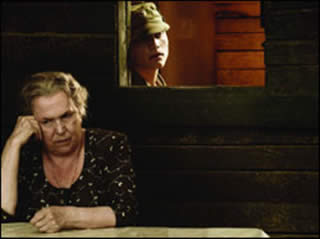
Andrei: Alexander Sokurov knows music himself very well. He is terribly demanding. Every time you work with him in each of his individual films it is an opportunity to go on the next level. This is the only director that I have met that I can have long conversations about music with. Usually it happens that I can write music at the first go. But it happens because we have such a huge understanding and our relationship is such that it just comes out. We are not just partners and professionally connected. In real life we are very close friends.
James: This is not a political film, is it?
Andrei: No.
James: What role do you think music plays in this particular film?
Andrei: We had a very difficult shoot. It’s a fact that the war was till happening and when we were there. 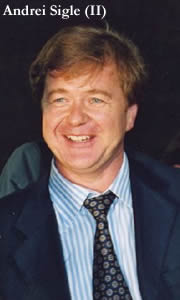 We saw the war.
We saw the war.
James: You were there, in Chechnya, filming during the war?
Andrei: Yes. We were there on purpose to feel the pain of the people not just to rely on hearsay. The main thing was the compassion and love he felt with the suffering people. I felt and understood the pain that they were living with on a daily basis—Destroyed homes, lives, and homeless children. That is why I was writing the music as if I was writing an anthem to these people.
James: Will this be a politically difficult film to show in Russia?
Andrei: No, it. is not a problem because it is not a political film to the degree where it would cause problems.
James: Has it opened in Russia?
Andrei: Yes actually. It was released in November.
James: So this is exciting for you. Is this your first trip to America?
Andrei: No it is my second.
James: Well, thank you very much for all of your time.
